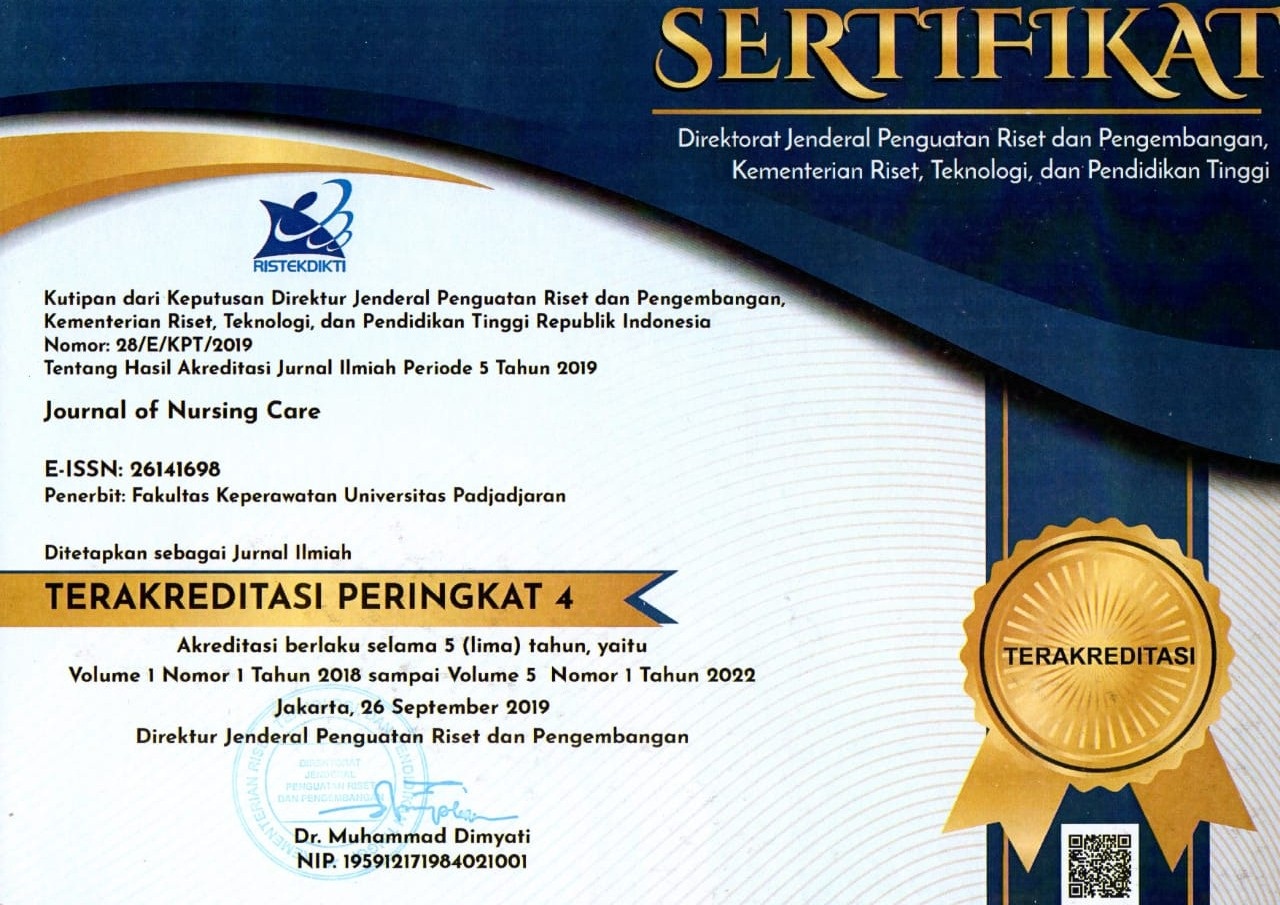Mother’s Behaviour in Overcoming Noctural Enuresis in Toodlers
Abstract
The developmental task that children have to go through in toddlerhood is to control bowel movements or urination. Data obtained on the incidence of enuresis in children as much as 80% is nocturnal enuresis. This requires parents to be able to educate good behavior for children regarding urination problems, especially at night. Treatments that can be done by parents to overcome bedwetting behavior in children are: firstly giving motivation to children not to wet the bed again, secondly by giving rewards if the child succeeds in not wetting the bed, the third is by behavior therapy (behavior treatment), namely exercise control urination, the fourth woke the child to urinate while sleeping at night (alarm therapy/enuresis alarm), the fifth used medical therapy/drugs, and the sixth was hypnotherapy/hypnoparenting/acupuncture. The social and psychological impacts caused by enuresis are very disturbing the lives of a child and a mother. The adverse effects of enuresis psychologically and socially will affect the quality of life of children as adults. The purpose of this study was to determine the behavior of mothers in overcoming nocturnal enuresis in toddlers in Indramayu. This research method is a quantitative research with a descriptive approach. The population in this study were mothers who had toodler children in Pabean Udik Village, Indramayu Regency. The sampling technique used total sampling technique with respondents, namely: mothers who have children aged 1-3 years as many as 92 respondents. The instrument of this study used a questionnaire made by researchers about the description of the mother's behavior in overcoming nocturnal enuresis which had been tested for validity and reliability tests. Analysis of the data used is univariate analysis in the form of presentations. The results of the research on the behavior of mothers in the poor category in overcoming bedwetting in toddlers were 52 respondents (56.5%) and the behavior of mothers with good categories in overcoming bedwetting in toddlers was 40 respondents (43.5%). The domain of maternal behavior consists of the domains of health knowledge, attitudes towards health and health practices. The behavioral domain of health practices has not been done well by mothers. This can be seen from the behavior carried out by mothers, mothers get used to scolding children to overcome bedwetting, mothers familiarize children with using pampers to prevent bedwetting, and only some mothers give gifts when children do not wet the bed to motivate children to stop wetting. The conclusion from the study was that the mother's behavior was not good in dealing with bedwetting in children. Therefore, the follow-up needed to have cadres in the community to provide education about toilet training to mothers aged 1-3 years so that the problem of nocturnal enuresis in toodler children is resolved.
Keywords
Full Text:
PDFReferences
Alimul, A. A. 2005. Pengantar ilmu keperawatan anak Edisi 1. Jakarta: Salemba Medika
Anugraheni, I. (2017). Pengaruh hypnoparenting terhadap frekuensi diural enuresis pada anak pra sekolah. Jurnal Penelitian Kesehatan, 4(2), 50-54. Retrieved from http://jurnal.stikvinc.ac.id/index.php/jpk/article /view/16/16. (Diakses pada hari Minggu, 10 Februari 2019, jam 22.00).
Brazelton, T. B. (2003). Born To Be Genius. Jakarta: Prestasi Pustaka.
Cahyaningsih, S. D. (2011). Pertumbuhan perkembangan anak dan remaja. Jakarta: Trans Info Medika.
Denada, O. R., Nazriati, E., & Chandra, F. (2015). Gambaran pengetahuan dan sikap ibu tentang pelaksanaan toilet training pada anak usia 1-3 tahun di wilayah kerja posyandu Kelurahan Suka Maju Kecamatan Sail Kota Pekanbaru. Jom FK 2(2). Retrieved from https://jom.unri. ac.id/index.php/ JOMFDOK/ article/view/ 6449. (Diakses pada hari Kamis, 10 Januari 2019).
Effendi, I. H. (2016). Hubungan dukungan orang tua dengan keberhasilan toilet training pada anak usia prasekolah. Skripsi: Program Studi Keperawatan S1 Universitas Muhammadiyah Kota Surakarta. Retrieved from http://eprints.ums.ac.id/50151/. (Diakses pada hari Jumat, 25 Januari 2019 jam 20.00).
Hidayat, A. A. (2005). Pengantar ilmu keperawatan anak I. Jakarta : Salemba Medika.
Istikhomah, H., & Kirwanto, A. (2015). Perilaku ibu tentang toilet training pada anak usia 1-3 tahun di desa kajoran kecamatan klaten selatan. Jurnal Kebidanan Indonesia 6 (2). Retrieved from https://stikesmus.ac.id/ jurnal/index.php/JKbln/article/view/116. (Diakses pada hari Sabtu, 13 Juli 2019, jam 17.00).
Lutviyah. (2017). Hubungan perilaku orang tua terhadap kemampuan toilet trraining pada anak usia toddler (18-36 bulan). Skripsi: Program Studi Diploma 4 Kebidanan Sekolah Tinggi Ilmu Keseshatan Insan Cendikia Medika Jombang. Retrieved from http://repo. stikesicme-jbg.ac.id/215/1/SKRIPSI %20LUTVIYAH%20PERPUS.pdf. (Diakses pada hari Minggu, 10 Februari 2019, jam 20.00).
Munawaroh, S. (2018). Perilaku ibu dalam melatih toilet training pada balita usia 12-36 bulan. Jurnal Kebidanan Dharma Husada 7 (1). Retrieved from https://akbid-dharmahusada-kediri.e-journal.id/JKDH/article/view/27. (Diakses pada hari Sabtu, 13 Juli 2019, jam 17.30).
Mushfiroh, M., & Wisudaningtyas, L. B. (2015). Penyuluhan terhadap sikap ibu dalam memberikan toilet training pada anak. Jurnal Kesehatan Masyarakat 9 (2). Retrieved from http://journal.unnes.ac.id/ nju/index.php/kesmas.(Diakses pada hari Sabtu, 13 Juli 2019, jam 17.30).
Notoatmodjo, S. (2010). Pendidikan dan perilaku kesehatan. Jakarta: Rineka Cipta.
Permatasari, R. C., Perdani, R. W., & Bustomi, E. C. (2018). Diagnosis dan tatalaksana enuresis pediatri. Majority 7(2). Retrieved from http://juke.kedokteran.unila.ac.id/index.php/majority/article/view/1891. (Diakses pada hari Minggu, 10 Februari 2019, jam 21.00).
Putri, M. M. (2020). Gambaran Pengetahuan Ibu Balita Tentang Stunting di Desa Kalipucang Kabupaten Pangandaran (Doctoral dissertation).
Riyanto, A. (2011). Aplikasi metodologi penelitian kesehatan. Yogyakarta: Nuha Medika.
Setiowati, W., & Pawestri, N. D. (2018). Aktivitas terapi akupresure terhadap frekuensi enuresis pada anak usia 3-4 tahun. Jurnal Darul Azhar 5(1), 94-102. Retrieved from http://jurnal-kesehatan.id. (Diakses pada hari Selasa, 5 Februari 2019, jam 19.00).
Soetjiningsih. (2016). Tumbuh kembang anak (Ed 2). Jakarta: EGC.
Syari, E., Chandra, F., & Risma, D. (2015). Gambaran pengetahuan dan sikap ibu tentang pelaksanaan toilet training pada anak usia 1-3 Tahun. Jom FK, 2 (2). Retrieved from https://www.neliti.com/id/ ublications/185552/gambaran-pengetahuan-dan-sikap-ibu-tentang-pelaksanaan-toilet-training-pada-anak. (Diakses pada hari Selasa, 5 Februari 2019, jam 17.00).
DOI: https://doi.org/10.24198/jnc.v4i3.24501
Refbacks
- There are currently no refbacks.

This work is licensed under a Creative Commons Attribution-ShareAlike 4.0 International License.










Redaksi Journal of Nursing Care:
Fakultas Keperawatan, Universitas Padjadjaran
Jalan Raya Bandung-Sumedang Km. 21 Jatinangor, Sumedang, Indonesia 45363
WA: 085314295890
Tlp. 022-7795596
Email: jnc.fkep@unpad.ac.id

This work is licensed under a Creative Commons Attribution-NonCommercial 4.0 International License


